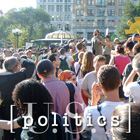
|
THE WALL GOES UP AGAINST ILLEGAL IMMIGRATION WHILE CLAIMING NOT TO MILITARIZE, BUSH PLANS SEVERAL HUNDRED MILE FENCE, BUILT BY DEFENSE CONTRACTORS 18 May 2006 On Monday, George W. Bush announced a "five-point plan" for curbing illegal immigration and recognizing and regularizing the estimated 12 million immigrants living in the United States without proper residence or work permits. Now, as the Senate has voted to 83-16 to include a 370 mile protection barrier in its immigration reform legislation, the White House is enlisting major defense contractors to build the fence. The House bill, passed in December, included twice as much border fencing, but the provision being part of both bills means it is certain to form part of the final bill once resolved through conference committee. Yesterday's votes however also put down an attempt to limit provisions permitting a "path to citizenship" for undocumented immigrants. The border fence has long been a sticking point in the debate over immigration reform legislation. Hardliners want the fence, to delineate in concrete terms where the terrain shifts from legal to illegal for those who would try to cross the border without legal documentation. There is also the temptation to build what's been called, partly with irony, partly with wistful anticipation, "Fortress America". Since the House of Representatives passed its draconian immigration bill in December, which seeks to criminalize any instance of irregular immigration status, as well as any act of charity toward those without proper documentation, a movement has sprung up across the country to demand that immigrants be treated as human beings first, as document-carriers second. The debate has now hardened into a terrain with very little viable middle ground, between those who want to mobilize the local police, the military and federal agents to track down, detain, imprison and deport, some 12 million people, and those who want to create a process for granting citizenship to those undocumented immigrants, in order to normalize the irlegal situation and the economy that depends on their labor. That hardening has led to the debate shifting ever more toward the idea that it might be politically acceptable to appease radical border hawks by building a limited barrier, while still extending a helping hand to those undocumented workers who have not committed any crimes while working and building families and lives in the US. It would seem a contradiction: for decades, US foreign policy railed against the brutality of the "Iron Curtain" and its functioning as an impediment to trade, liberty and regional stability. Though referring to the totalitarian political system enforced from Moscow, it also connoted the Berlin wall, and the very real way in which a superpower erected a barrier against crossing to a world of opportunity. It is, then, a twist of fate, that the superpower opposing that practice is now doing something eerily similar. Despite obvious differences, the effect will remain: those living in a harder environment, with less opportunity, will be prevented by a global superpower from crossing a political border to a place where they might enjoy more freedom, a better standard of living and real opportunity to move up the socio-economic ladder. Yet, in an effort to deflect attempts to waterdown or ruin the reform bill currently under debate in the Senate, senators have passed language adding 370 miles of border fence to the border security part of the package. Pres. Bush told Republican donors that "America can be a lawful society and a welcoming society and we don't have to choose between the two". Meanwhile House bill sponsor James Sensenbrenner (R-WI) has said anything that does not require deportation of all undocumented workers amounts to "amnesty for lawbreakers" and indicated that he will push his criminalization measures in any conference committee negotiations to resolve differences —which look like they'll be radical— between House and Senate bills. Other Senate opponents to regularization continue proposing amendments designed either to scuttle the legislation or to radically alter the legal position of the federal government toward immigration and culture. Sen. Inhofe (R-OK) has proposed an amendment that would establish English as the national language. The move would violate the First Amendment, which requires "Congress shall make no law ... abridging the freedom of speech, or of the press; or the right of the people peaceably to assemble, and to petition the Government for a redress of grievances." But, it could feasibly pass the Senate, be included in the resolved bicameral legislation, and become law, before facing any court challenge on the grounds of its constitutionality. The key underlying tension in the current debate is not strictly legal or political. It is also cultural. There is a tension between those who wish to claim for themselves a birthright over a nation to which their own ancestors came as immigrants and those who believe that it is the vibrant, multinational culture of the United States, throughout its history, that has brought the prosperity, the democratic vigor and the global influence the nation now enjoys. [s]
BACKGROUND/DE TRASFONDO: Anoche, George W. Bush presentó desde su despacho en la Casa Blanca, un plan de cinco puntos claves para una "reforma comprensiva" de la política migratoria de Estados Unidos. El plan incluye despachar 6 mil soldados de la Guardia Nacional a la frontera con México y un carnet biométrico para los inmigrantes, pero también moderó su retórica, recordando que "todo ser humano tiene valor y dignidad, a pesar del estatus de sus papeles de ciudadanía." [Texto completo] NEW ROUND OF MASSIVE PRO-IMMIGRANT DEMONSTRATIONS Peaceful rallies in more than 60 US cities took place yesterday, to protest against House Republicans' plans to classify all undocumented immigrants as felons, to build fortified wall between US, Mexico. Tens of thousands gathered in major cities, carrying banners reading "We are America" and waving American flags and flags of their countries of origin. [Full Story] IMMIGRATION REFORM COULD EASE HARDSHIP FOR MILLIONS In recent weeks, the United States has seen the streets of major cities flooded with protesters, demanding more humane immigration reform than that offered by the House of Representatives. The bill currently before the Senate could offer such a solution, and would provide an opportunity for millions more people to become US citizens. [Full Story] |
||||||||||||||||
|
|||||||||||||||||









